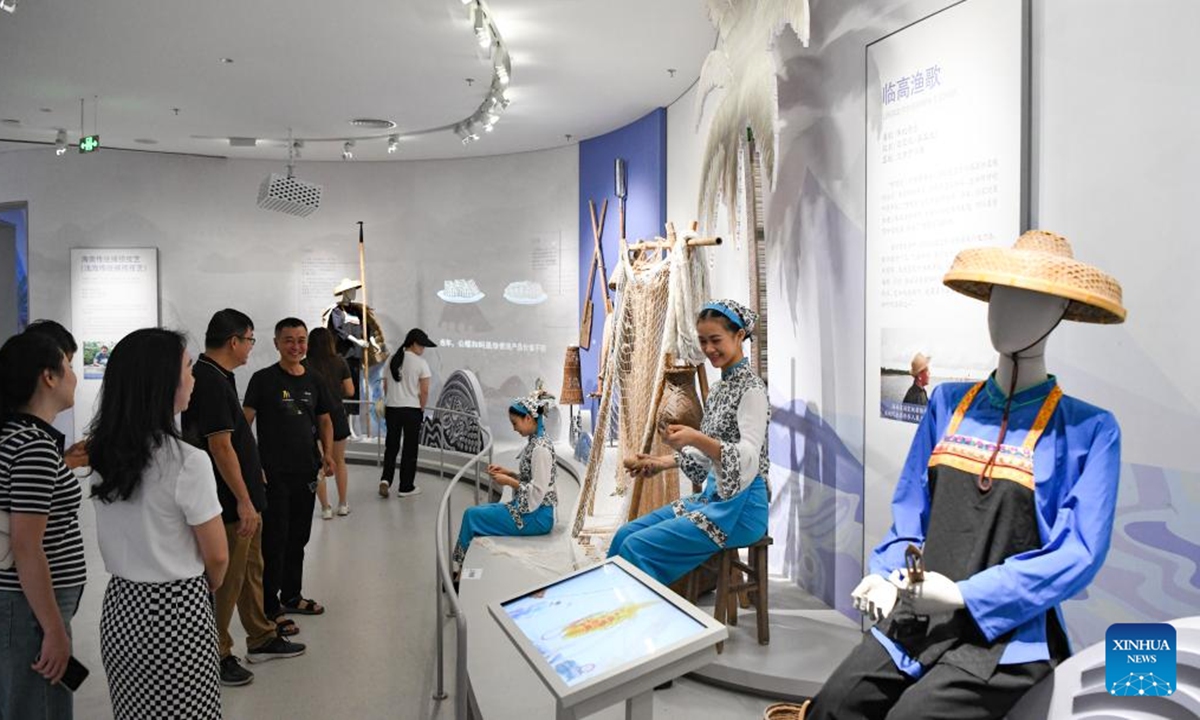China establishes ICH preservation programs in 21 universities to foster transmission, innovation

People visit the Hainan Intangible Cultural Heritage Exhibition Center in Haikou, south China's Hainan Province, Sept. 30, 2024. The exhibition center, one of the provincial capital's major public cultural projects, began trial operation on Monday and will last for one month. (Photo: Xinhua)
China has established intangible cultural heritage (ICH) protection programs at 21 universities, the Ministry of Culture and Tourism announced during a press conference on Thursday. Experts noted that this initiative aims to enhance the preservation and innovation of ICH through academic support, providing a steady stream of professional talent and expertise for its safeguarding efforts.
China currently provides ICH programs at the undergraduate, graduate and doctoral levels, with a comprehensive curriculum that includes ICH transmission and preservation, as well as innovative development.
Experts emphasized that more focus will be placed on ICH with industries like tourism to create economic value in the future, and that this vision is likely to gain traction as more professionals, trained in relevant fields at universities, enter the workforce.
"I have been passionate about intangible cultural heritage since secondary school. At university, I studied the history of many kinds of ICH and systematically learned preservation techniques, which differ significantly from those used for architectural heritage conservation," a student from the course of Intangible Cultural Heritage Protection in Zhejiang Normal University told the Global Times on Thursday.
Local governments are making concerted efforts to engage young people in learning about ICH, working together to promote its preservation, transmission and the development of future talent.
East China's Shandong Province is actively promoting and educating about ICH, organizing activities that appeal to young people. Early positive outcomes have already been observed, according to a report from the Shandong provincial education authorities.
Southwest China's Guizhou Province announced that the provincial, municipal and county-level ethnic and cultural departments have successfully introduced ICH related to ethnic minorities into ethnic middle schools, yielding positive results.
China has initiated a training program of ICH inheritors to assist practitioners in enhancing their skills, benefiting over 100,000 individuals to date, Hu Yan, an official from the Ministry of Culture and Tourism, told reporters at the press conference.
Additionally, the central government has set up dedicated funding to support the preservation of ICH. These funds are allocated for the protection and promotion of national-level ICH representative projects, inheritors and cultural ecological protection zones across the country.
China currently has over 100,000 ICH items listed at the national, provincial, municipal and county levels. Among these, 43 projects have been included on UNESCO's Intangible Cultural Heritage lists, solidifying China's global leadership in this area.
"Promoting the development of disciplines related to ICH is key to fostering cultural confidence and advancing China's strategy of becoming a cultural powerhouse," Zhang Lingyun, executive editor-in-chief of Tourism Tribune, told the Global Times on Thursday. "The preservation and innovation of ICH require collaboration between education, employment and various sectors of society," Zhang said.
Zhang emphasized that greater focus should be placed on the practical application and commercialization of ICH in the future as this will facilitate its preservation and continued development.



